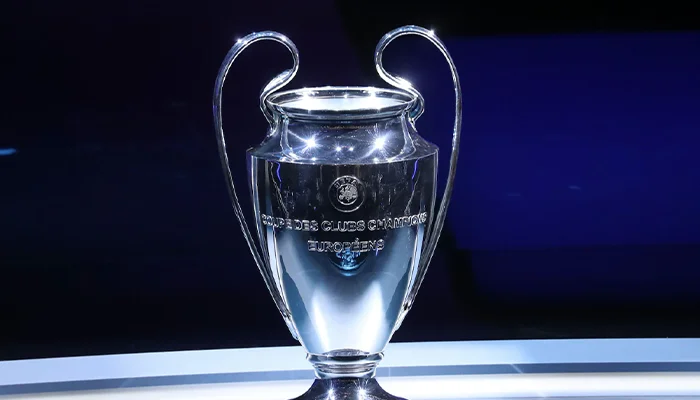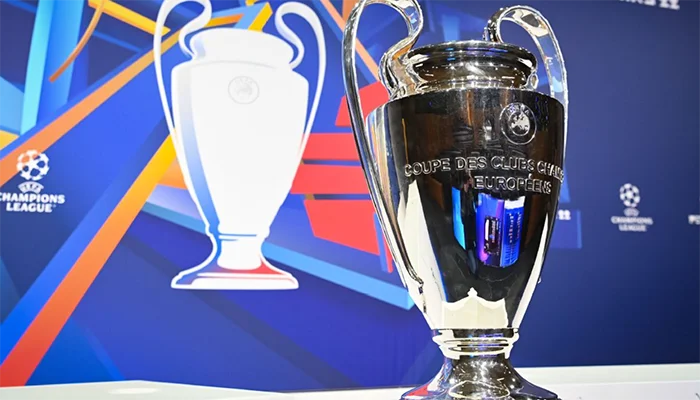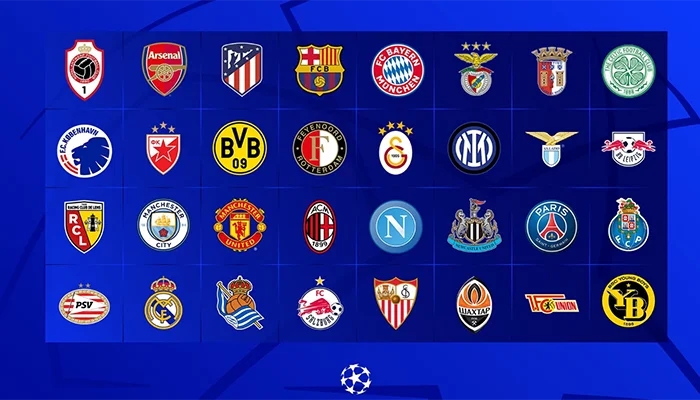Everything You Need to Know about the New Champions League Format

(Manchester City with the UEFA Champions League Trophy)
UEFA Champions League is one of the most widely followed leagues in the game of Football and with the ever-evolving nature of the game, the fans are all set to witness the UEFA Champions League new format which promises to increase the pace of the game and offer more excitement to the fans. With the Championship being introduced in 1955, there have been several changes made in the competition and now again, the football federation has decided to introduce something new for the fans. In this guide, we will be discussing what is the new Champions League format and how the Champions League new format 2024 is going to make the game better.
What changes to the Champions League format from the 2024/25 season?
Big changes are coming to the UEFA Champions League format starting in the 2024/25 season. The biggest shift is moving away from the current group stage setup which will allow the teams to have better opportunities to qualify for the next round.
- Right now, the group stage has 32 teams split into 8 groups of 4 teams each. But in the new format, there will be 36 total teams all together in one big league competition. This gives 4 more clubs the chance to play against Europe's best.
- Instead of playing just 3 opponents home and away, each team will face 8 different opponents under the revamped system. Out of those 8 matches, they'll play 4 at home and 4 away.

(UEFA Champions League Trophy)
- To determine who plays who, the 36 teams will first be split into 4 seeded pots. Then each team gets drawn to play 2 teams from each of the 4 pots allowing them to face a wider variety of opponents.
This new format allows the top teams to face each other more often earlier in the competition, increasing the excitement. It also ensures more competitive matches for all clubs since every game carries higher stakes.
Why is this all happening?
The new Champions League format 2024 has been revamped to enhance the level of competition and intensify the matches. This change introduces 36 teams into the mix, promising fans more thrilling and competitive encounters. UEFA's objective is to provide clubs with the opportunity to challenge a broader array of opponents, fostering a more diverse and dynamic tournament. The new structure is designed so that top teams will clash more frequently and earlier in the competition, ensuring high-stakes matches right from the start.
Under the Champions League's new format in 2024, the group stage will expand to include more teams, allowing for a greater variety of matchups and increased unpredictability. This shift aims to heighten the excitement for fans and add layers of strategy for the participating clubs. Each team will now have the chance to face a wider range of European football styles and tactics, making every match a unique challenge.
How will the four additional places in the Champions League group stage be allocated?
With 4 more teams joining the Champions League, UEFA has come up with a fair system to hand out those extra spots. They want to reward the best-performing clubs and leagues across Europe. The most important thing in the new format of the UEFA Champions League is the standings in the last season and according to it, the teams will be given points to get in the league stage of the tournament. To classify the four spots, the teams will be divided into:
- One of the extra Champions League spots will go to a club from the country ranked 5th in UEFA's association rankings. Specifically, it will be awarded to the 3rd-place team in that league's standings. This gives another path for top clubs in strong leagues to qualify.
- The other additional slot will be given through the Champions Path of the qualifying rounds. Instead of just the domestic champions from 4 leagues entering at this stage, it will now include the champions from 5 different leagues. So the Champions Path qualifying rounds are being expanded from 4 rounds to 5 rounds.

(A picture of theUEFA Champions League Trophy)
- For the third and the fourth spot in the Champions League, the places will go to leagues based on their overall club performance from the previous season. UEFA will look at how all the teams from each domestic league did across European competitions. The top two associations with the best collective results will each get an automatic group stage entry for the next highest-ranked club in their league after the Champions League qualifiers.
So if a country had multiple teams go far in Europe the season before, they get rewarded with an extra Champions League spot for one of their top finishers.
Will the format for the knockout phase change?
Getting the Champions League's new format explained, it is now the time to look at the Knockout stage which is also undergoing a change because of the addition of 4 new teams. Besides this, the extension in the number of matches has also made things bigger for the Football Federation and the new changes are as explained:
|
Stage of the Tournament |
Qualification Scenario |
|
Qualifying directly to the next round |
Out of the 36 teams, the top 8 have a chance to directly enter the Round of 16s in the tournament. |
|
Play-offs stage in Knockouts |
Two-legged knockout play-offs will be held for teams ranked 9th to 24th, competing for the remaining spots in the round of 16. (Here the rankings will determine the position of the teams from the League Phase) |
|
Eliminated from the Tournament |
Teams ending up below 25 in the League Phase will be eliminated from the tournament. |
Once the teams enter the Rounds of 16, the tournament will move on with the pace of traditional Knockouts systems where a total of 8 teams will enter the Quarter-Finals and will battle out to make it to the Semi-Finals of the tournament where only 4 teams will be present. After that, two teams will advance to the Finals of the tournament to decide the ultimate winner.
How many more games will be played and when will they be played?
In the older format of the UEFA Champions League, the fans witnessed a total of 125 games where the League matches took place in Weekdays while the Finals of the Tournament was played on a Saturday. But with the new format of the UEFA Champions League, the fans will be witnessing a total of 189 games in a season as all the teams will be playing a total of 8 games in the League stage against all the different opponents.

(Teams of the UEFA Champions League)
4 matches will be played by a team at home while the other 4 matches will be played at away grounds, thus maintaining the fun and excitement for the fans. The increased number of matches will take place during the weekdays only and now the Group Stage will end in January rather than in December.
What competition calendars will be in the new format?
Throughout the year, the fans witness three competitive Leagues from UEFA, and with the UEFA new Champions League format approved, the scheduling of the Leagues has been changed. Now, the matches of all the three Leagues will be held according to the given plan below:
- Champions League:According to the new Champions League format example, the matches will be conducted from the month of September and will go on till the month of January. Here, the regular matches will be conducted on Tuesdays and Wednesdays while the Exclusive match week(In Exclusive match week, only the matches of the Champions League will be conducted)will take place on Tuesdays, Wednesdays, and Thursdays.
- Europa League: Just like the Champions League, the Europa League will be conducted from September to January and the regular matchdays will be on Thursdays only. For the Exclusive match week, UEFA has decided Wednesdays and Thursdays as the perfect days.
- Europa Conference League:This League has been scheduled between the months of September to December and the regular matches will take place on Thursdays only. Considering the exclusive match week, the fans will get the action on Thursdays only.
In each league phase's final matchday, all games will be played at the same time. This arrangement is done to increase the excitement for fans, who can experience the thrill of discovering which teams will progress to the next stage in real time.
How will fans benefit from the new Champions League format?
UEFA’s new Champions League format is going to make things exciting and better for the fans who are avid supporters of the game. The new format is packed with exciting changes that will thrill football fans across the globe.
- The first advantage for fans is the opportunity to see how their favourite teams are grouped and to assess the ease or difficulty of their path to qualification.
- The fans will witness way more matches from their favourite clubs in the opening league phase. Instead of just a handful of group-stage games, teams will now play 8 different opponents right from the start.
- With every game being counted in, there isn’t any place for the dead-rubbers which means the fans will turn up to every game as a knockout one.
This structure ensures that each result carries significant weight, making the tournament more engaging and unpredictable for fans.
Will the Europa League and Europa Conference League formats change from the 2024/25 season?
Since all three Leagues, Champions League, Europa League and Europa Conference League come under the association of UEFA, the format of all the Leagues is going to change and it will be a big step in promoting the game globally. In the 2024/25 season, the Europa League and Conference League will see a revamped league phase. Teams in the Europa League will play 8 matches against 8 different opponents, while those in the Conference League will compete in 6 matches against 6 different teams. Both tournaments will expand to include 36 teams in the league phase, increasing the competitiveness and diversity of matchups. This new structure aims to offer a richer experience for fans, with more varied and frequent encounters.
How has the Champions League format changed over the years?
The UEFA Champions League has come a long way since its beginnings in 1955 as a simple knockout tournament for domestic league champions. Over the decades, this competition has undergone numerous transformations to keep up with the ever-changing landscape of European football. Let's take a look at how the format has evolved:
- It all started small with only a handful of teams battling it out in a knockout format. But as more teams joined, UEFA started the concept of group stages to accommodate an increasing number of participating clubs from across the continent.

(Christiano Ronaldo with the UEFA Champions League Trophy)
- When the tournament started, the qualification was a straightforward process where the team just needed to be the country's league champion. However, as the tournament grew, UEFA implemented seeding systems and club coefficient rankings to determine the strongest teams for entering the tournament.
Now, with the UEFA new Champions League format, the number of teams is again expanded from 32 to 36 with each team playing 8 games against 8 different opponents. With all these changes, UEFA is still looking to grow and make the Leagues bigger and better for the fans.

Comments
Sign up or log in to your account to leave comments and reactions
0 Comments